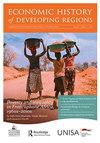Factory, family, and industrial frontier: A socioeconomic study of Chinese clothing firms in Newcastle, South Africa
IF 0.8
Q1 HISTORY
引用次数: 5
Abstract
ABSTRACT This paper examines ethnic Chinese garment production and Zulu women workers in Newcastle, South Africa - a former border town between white South Africa and the black KwaZulu homeland. The established scholarship, while providing useful explanations for the arrival of ethnic Chinese clothing factories and offering valid critiques of South Africa's industrial policies, pays little attention either to Chinese business practices or their long-term impact on Zulu women workers' lives. Using both archival and ethnographic evidence, this paper argues that in response to harsh business and socioeconomic conditions, both the ethnic Chinese industrialists and Zulu women workers have creatively utilized and reshaped existing familial arrangements to operate factories and maintain stability as a workforce. It highlights the ways in which capitalist production transplants, adapts, and refashions its material and cultural forms on the frontier. In many ways, Chinese industrialists and Zulu women are not passive products but active shapers of the industrial frontier.工厂、家庭与产业前沿:南非纽卡斯尔中国服装企业的社会经济研究
摘要本文考察了南非纽卡斯尔的华裔服装生产和祖鲁族女工。纽卡斯尔曾是南非白人和夸祖鲁黑人的边境小镇。这项既定的奖学金虽然为华裔服装厂的到来提供了有用的解释,并对南非的产业政策提出了有效的批评,但很少关注中国的商业实践或其对祖鲁女工生活的长期影响。利用档案和人种学证据,本文认为,为了应对恶劣的商业和社会经济条件,华裔实业家和祖鲁族女工都创造性地利用和重塑了现有的家庭安排,以经营工厂并保持劳动力的稳定。它强调了资本主义生产在边疆移植、适应和重塑其物质和文化形式的方式。在许多方面,中国实业家和祖鲁妇女不是被动的产品,而是工业前沿的积极塑造者。
本文章由计算机程序翻译,如有差异,请以英文原文为准。
求助全文
约1分钟内获得全文
求助全文

 求助内容:
求助内容: 应助结果提醒方式:
应助结果提醒方式:


